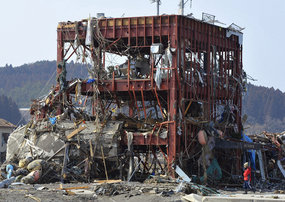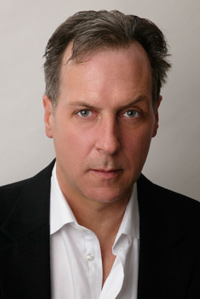 As of yesterday morning, the official death toll from Japan’s 9.0-magnitude earthquake and killer tsunami has passed 2400.
As of yesterday morning, the official death toll from Japan’s 9.0-magnitude earthquake and killer tsunami has passed 2400.
I’m not sure what more to say than this: the families mourning the 2,414 people who have been confirmed dead, the families of the 3,118 missing, and everyone who is related to the 1,885 injured certainly need our prayers.
Tragedies such as this always prompt the question: Where is God? Why does this happen?
And luckily for me, I still keep in touch with a brilliant professor, Joe Incandela, who used to teach the class “Faith Meets Philosophy” back when I was a religious studies major at Saint Mary’s College in Notre Dame. I contacted him after Virginia Tech, and then after Haiti’s earthquake in January of last year. And because I can be really dense at times, had to ask him for like the 20th time yesterday why bad things happen to good people.
I know that God is all powerful and all loving and all knowing, and so I always forget the part that allows for disasters like these to happen. Dr. Incandela he sets me straight, or at least straighter.
I know that I am going to totally butcher his logic if I try to paraphrase what he told me, so I’ll just let you read his explanation, word for word:
There are a couple options:
1) There is no God.
2) There is a God, but God is malevolent and all-powerful, and gets kicks from watching things like tsunamis kill innocent people.
3) There is a God, but that God, while good, is not all powerful, and so is immensely saddened from watching things like tsunamis kill innocent people.
4) There is a God, all-powerful, loving God whose creation inevitably allows evil to happen.
If #4, we naturally strain and struggle to find a reason why evil (in this case, natural evil) happens. That’s on the one hand natural, but on the other potentially problematic. What we DON’T want to do in looking for a reason is to somehow justify (from God’s perspective) what happened. At that point, we’ve now made the problem go away by turning the evil into a good. That is, the difficulty is to let tragic things be tragic (namely, things for which no reason is a sufficient explanation). So, I think the most that can be attempted is to grasp why, IN GENERAL, things like this would happen.
One way to think about this is in terms of a finite world. Finitude inevitably accompanies creation. Only God is infinite, and so anything that God creates (since it comes into existence, depends on God, etc.) will be finite. Finite things inevitably come into conflict with other finite things. Lions need prey to survive, germs are killed by good guys in my body (sometimes), etc. The conflict in this case is a very real one of two plates rubbing against each other due to pressure.
The other way to think about things like this, in general, is that were God constantly intervening in the natural order (to prevent things like damage done when plates rub against each other), then really no good deeds would be possible. Many times, our advance as moral beings is contingent upon overcoming some obstacle, fighting the friction of human finitude and the suffering it causes others and ourselves. If all of those obstacles just went away in a great cosmic poof, then we’d be doing the equivalent of trying to propel ourselves forward on a frictionless surface. Can’t be done. If the forward movement has value, then the friction is necessary.
We’ve had these conversations before on Beyond Blue, especially back in the day when Larry Parker was always offering some kind of philosophical comment to my posts (We miss you, Larry!).
Professor Incandela’s explanation does help me to better wrap my brain around colossal catastophes, in a sense, or at least to not let them interfere with my faith in a loving God.
But, again, the only real intelligent thing I have to say is just that Japan needs our prayers.
* Click here to subscribe to Beyond Blue and click here to follow Therese on Twitter and click here to join Group Beyond Blue, a depression support group. Now stop clicking.

